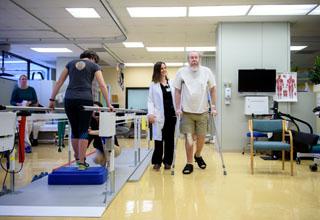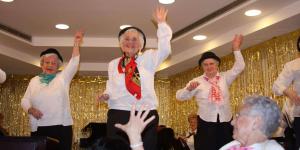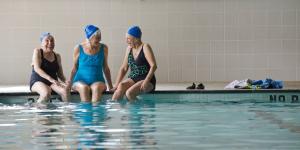Winter Safety for Older Adults
Fall prevention tips to help older adults enjoy outdoor winter activities

One out of every three adults 65 and older will fall. The majority of those falls occur outside the home and start with a slip or a trip. If you’re a senior, don’t let your fear of falling keep you home-bound. If you prepare and stay aware, you can continue to enjoy being out and about even during the cold Boston winters.
Why do we fall?
Sensory input from vision, joints, and sense of touch—especially the bottom of the feet—provides information to the brain about the location and position of our body. Muscles and nerves react to provide movements that help us adjust for any change in position that could cause us to lose our balance.
When these systems are affected by weakness, joint arthritis, neuropathy, or illness and disease, the ability to coordinate and compensate for sensory input is decreased or delayed causing loss of balance and falls.
There are steps that older adults at risk for falls can take to increase safety when venturing outdoors.
Plan ahead for winter activities
- Plan your day’s activities to avoid fatigue.
- Know where you are going ahead of time.
- Give yourself plenty of time to get to your destination. Take your time—hurrying can increase fall risk.
- Turn on your porch light if you will be returning after dark.
Be prepared
- If you take medication make sure you take it correctly as prescribed and anticipate any side effects.
- Bring a snack if you are diabetic to avoid low blood sugar levels.
- Bring water to stay hydrated.
- Wear low-heeled shoes with rubber traction.
- Use caution with winter boots as they can be heavy and may restrict clearing your toes.
- Be aware that heavy or long winter coats can impede movement, and hoods or hats may decrease field of vision.
- Consider using traction devices on shoes, which can decrease falls on icy surfaces.
- Make sure you keep pathways clear of ice and snow in front of your home.
- Assistive devices, especially walker wheels and canes can often become covered by salt and slush and can make your floors slippery. Have a towel or rug available to wipe them off.
- Poorly lit areas increase fall risk. Travel in well-lit areas or bring a flashlight.
Optimize balance
- Be aware that weather conditions such as snow, rain, wind, and cold are distracting and can affect balance control.
- Having both hands free can improve reactions that help you maintain balance—so wear a cross shoulder bag, backpack, or fanny pack .
- Make sure your bag or pocket book is not too heavy.
- Use the correct assistive device prescribed for use in an outdoor environment.
- Make sure the tips of your cane or walker are in good condition. Replace them if they’re not.
Be aware
- Always be aware of your surroundings.
- Always use handrails when available.
- Take time to assess height of curbs before stepping up or off.
- Use ramps and curb cutouts to avoid curbs and steps.
- Always use crosswalks and designated walking areas.
- Watch for concrete car stops in parking lots, and avoid stepping over them.
- Be aware of outdoor surfaces—sidewalks can be uneven. Cracks, debris, and tree roots can become tripping hazards.
- Be careful when walking in areas of busy pedestrian traffic such as subway stations and storefronts.
- Avoid walking on icy patches, try to stay in treated areas, and do not try to step over snowbanks.
- When entering buildings, look for wet floors—they can be very slippery.
With simple precautions, older adults can continue to enjoy going out to meet with friends and take part in the activities they’ve always loved to do. Don’t let the cold weather keep you indoors.
Blog Topics
Learn More
Outpatient Rehabilitative Therapies
At Hebrew Rehabilitation Center in Boston and Dedham, MA, we offer adult physical therapy, occupational therapy, and speech therapy using state-of-the-art mobility and treatment equipment.





